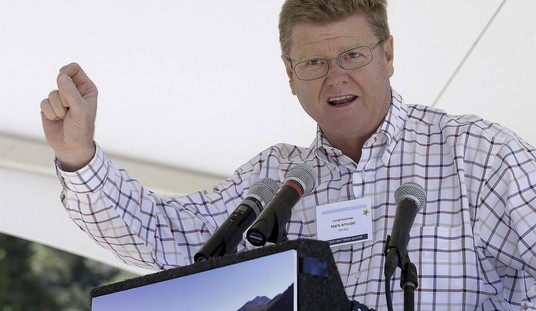Over at Vox.com, their resident foreign affairs expert and anti-Semite anti-Israel, pro-Palestinian terrorist, a guy named Max Fisher, takes up the cause being pushed all over the left this weekend: that ISIS really isn’t Islamic because Islam is really a religion of peace or something like that.
This argument has been thoroughly discredited.
An easy test of this hypothesis is what do actual Muslims think?
Egypt’s Al-Azhar issued a statement Dec. 11, 2014, refusing to declare the Islamic State (IS) apostates. “No believer can be declared an apostate, regardless of his sins,” it read. Al-Azhar’s statement came as a Nigerian mufti seemingly declared IS apostates at a Dec. 4, 2014, Al-Azhar conference. Al-Azhar stated that various media outlets had misrepresented the mufti’s speech.
…
Tharwat al-Kharbawy, a Muslim Brotherhood defector, attributed Al-Azhar’s refusal to declare IS apostates to its “faith in IS’ actions,” during an interview with Ibrahim Issa on satellite TV.
One press report noted a degree of similarity between IS thought and Al-Azhar University’s curriculum, which “allows for killing a Muslim who does not pray, one who leaves Islam, prisoners and infidels within Islam [those who do not have a clearly specified creed or sect]. [It also allows] gouging their eyes and chopping off their hands and feet, as well as banning the construction of churches and discriminating between Muslims and Ahl al-Kitab [Christians and Jews], and insulting them at times.”
Ahmad Ban, a researcher of Islamic Affairs, told Al-Monitor that IS’ and Al-Azhar’s philosophies overlap, even if their practices on the ground differ. According to him, the overlaps could stem from President Abdel Fattah al-Sisi’s call for a religious revolution against certain texts that are considered sacred. Although these texts are not considered core texts, they represent a religious heritage encompassing hundreds of years. According to the Salafist Call, Al-Azhar and some terrorist groups like IS, these ideas cannot be subject to criticism, despite the fact that they are currently “causing concern to the whole world,” as Sisi said Jan. 1.
The “Al-Azhar” referred to is the mosque and university in Cairo that are a center of Sunni learning. So the answer is pretty clear. As far as the center of Sunni learning is concerned, ISIS is not only Islamic but they adhere to most of the same interpretations of Islam. Many scholars have examined ISIS and found that it is very Islamic. And that ISIS is violent precisely because it adheres to Islam.
Fisher’s entire contribution to the argument is to quote a guy named Reza Aslan. Aslan has frequently represents himself as a “religious scholar” even though his PhD is in sociology. He is not an observant Muslim. He has trolled Christians before with a book called Zealot: The Life And Times Of Jesus Of Nazareth which, no surprise here, finds Jesus was actually a Jew bent on the violent overthrow of Roman rule in Palestine.
In short, Fisher relies upon an entirely secular man with no particular credentials in the area other than a) he was raised a Muslim and no longer believes and b) he is available.
Islam doesn’t promote violence or peace. Islam is just a religion and like every religion in the world it depends on what you bring to it. If you’re a violent person, your Islam, your Judaism, your Christianity, your Hinduism is gonna be violent. There are marauding Buddhist monks in Myanmar slaughtering women and children. Does Buddhism promote violence? Of course not. People are violent or peaceful and that depends on their politics, their social world, the ways that they see their communities.
Aslan’s point is simple and correct: religions are big and diverse, and people get out of them what they bring into them.
This is nonsense on its face.
There is no evidence that the suicide bombers in either Paris or Beirut or Turkey over this bloody weekend were violent, per se. In fact, based on what we know from profiles of suicide bombers, they are usually passive, lost souls trying desperately to find some meaning in their lives. Islam fills this gaping hole. Are the young women who are trickling from Europe, many of them Europeans and Muslim converts, to ISIS territories to wed jihadis violent? Of course not. But the tenets of the religion they subscribe to are violent and that violence is an integral part of the faith to the extent that there is no theological push-back possible to refute the violence. In fact, as we show from the Sunni center of learning in Cairo, ISIS’s beliefs are exceedingly in line with what is taught there… and with how Islam is practiced in Saudi Arabia, Pakistan, Afghanistan, etc. etc.
Likewise, the phenomenon of violent Buddhists is so rare that we comment on it. Hinduism, likewise, has violent sects. How these sects differ from Islam is that they are so exceedingly rare that we notice. Not so much with Islam where violence and/or oppression against non-Muslims and Muslims of different sects are pretty much baked in. Likewise with Christians. Where conflicts in Northern Ireland and in the Balkans have had religious overtones the real force was political or ethnic with religion merely being a passenger in the bus, not driving it.
As my friend, and one of the founders of RedState, Josh Treviño, writes on Facebook:
…Ideas have consequences and power, ideologies have meaning and content, and faith transforms lives, until those enduring truths collide with the pieties of Acela Corridor explainer-set types — at which moment all narrative, concept, and schema becomes an edifice devoid of purpose except what its occupier, himself a changeless being, brings to it. In the Book of Vox, Saul is stricken with a vision of Christ on the road to Damascus, and He says, “Be who you always were, guy,” and Saul replies, “In that case I identify as a Paul.”
The Vox writer’s intent here is of course to defend Islam, by advancing an argument that Islam possesses no intrinsic power to change lives — for better or worse. It’s all self-actualization, as if the world’s second-largest faith were a benign Californian therapy group with a run of bad luck on the clientele. Of course there are plenty of Muslims who will tell something rather different: by our lights, good men who became bad by their understanding of the faith, but also bad men who became good by the same process. The sagacious seer of men’s souls Max Fisher argues that faith is incidental to both transformations. The men and women involved will declare it was essential to them. Here we see again the stunted intellectual universe of the elite drawing one of its leading lights, such as he is, into a defense of Islam that is in fact an infantilization of Muslims. They deserve better, but he is not equipped to know it, nor give it.
The truth is that most faiths, though of course not all, possess a concept something like what the Christian Church Fathers called metanoia — usually translated as “repentance” but more properly the transformation of the soul. It is visible in the tales of Paul, Raskolnikov, and Malcolm X. It is not “people get[ting] out of [religions] what they bring into them.” Quite the opposite: it is people getting out of religion what they never had before. Max Fisher of Vox does not misunderstand this because he lacks a grasp of faith: he misunderstands this because he does not grasp the nature of man…
This is why George Bush’s decision to separate the actions of the 9/11 hijackers from their religion was as profoundly as dangerous an act as Bill Clinton ignoring the rise of al Qaeda. This is why, ultimately, ISIS is going to control part of Iraq, part of Syria, Libya, probably Jordan, maybe Egypt. The West, as France sadly demonstrated over the weekend, is simply not psychologically prepared to say what is very obvious. Islam in its essence is violent. There may very well be peace-loving Muslims out there (other than those without firearms and bombs and knives) but they are peace-loving despite their religion, not because of it.













Join the conversation as a VIP Member